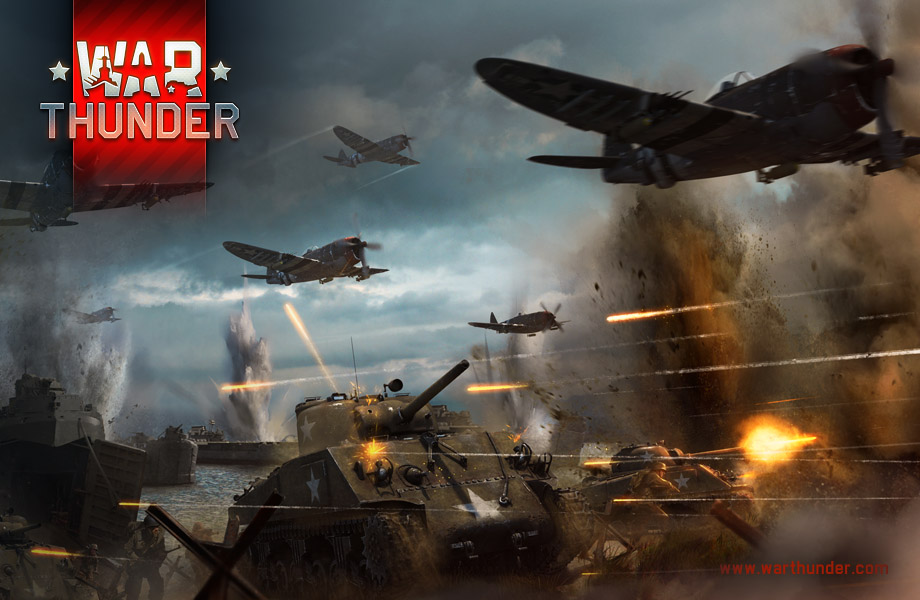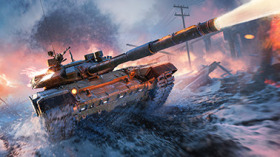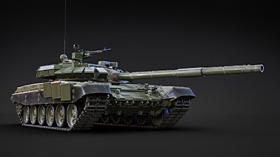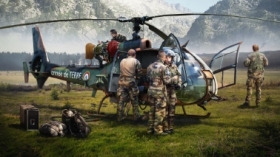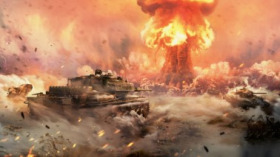
- For PC
- For MAC
- For Linux
- OS: Windows 10 (64 bit)
- Processor: Dual-Core 2.2 GHz
- Memory: 4GB
- Video Card: DirectX 11 level video card: AMD Radeon 77XX / NVIDIA GeForce GTX 660. The minimum supported resolution for the game is 720p.
- Network: Broadband Internet connection
- Hard Drive: 23.1 GB (Minimal client)
- OS: Windows 10/11 (64 bit)
- Processor: Intel Core i5 or Ryzen 5 3600 and better
- Memory: 16 GB and more
- Video Card: DirectX 11 level video card or higher and drivers: Nvidia GeForce 1060 and higher, Radeon RX 570 and higher
- Network: Broadband Internet connection
- Hard Drive: 75.9 GB (Full client)
- OS: Mac OS Big Sur 11.0 or newer
- Processor: Core i5, minimum 2.2GHz (Intel Xeon is not supported)
- Memory: 6 GB
- Video Card: Intel Iris Pro 5200 (Mac), or analog from AMD/Nvidia for Mac. Minimum supported resolution for the game is 720p with Metal support.
- Network: Broadband Internet connection
- Hard Drive: 22.1 GB (Minimal client)
- OS: Mac OS Big Sur 11.0 or newer
- Processor: Core i7 (Intel Xeon is not supported)
- Memory: 8 GB
- Video Card: Radeon Vega II or higher with Metal support.
- Network: Broadband Internet connection
- Hard Drive: 62.2 GB (Full client)
- OS: Most modern 64bit Linux distributions
- Processor: Dual-Core 2.4 GHz
- Memory: 4 GB
- Video Card: NVIDIA 660 with latest proprietary drivers (not older than 6 months) / similar AMD with latest proprietary drivers (not older than 6 months; the minimum supported resolution for the game is 720p) with Vulkan support.
- Network: Broadband Internet connection
- Hard Drive: 22.1 GB (Minimal client)
- OS: Ubuntu 20.04 64bit
- Processor: Intel Core i7
- Memory: 16 GB
- Video Card: NVIDIA 1060 with latest proprietary drivers (not older than 6 months) / similar AMD (Radeon RX 570) with latest proprietary drivers (not older than 6 months) with Vulkan support.
- Network: Broadband Internet connection
- Hard Drive: 62.2 GB (Full client)
ATTENTION! THE SPECIAL HAS BEEN SHIFTED TO 8:00GMT. SORRY FOR THE INCONVENIENCE
"D-Day: the 70th anniversary of the Allied landings in Normandy"
From 08:00 GMT on June the 6th till 08:00 GMT on June the 9th
Complete the following tasks:
Achievement 1 - destroy 70/35/24 enemy aircraft.
Achievement 2 - destroy 70/70/70 enemy tanks in tank battles.
Achievement 3 - In 70 battles - achieve at least 50% activity.
Reward: 100,000  for all achievements (total possible 300,000
for all achievements (total possible 300,000  )
)
Reward on completion of all achievements: collectible premium aircraft Boston Mk.I.
Achievements can be performed in any order, at the same time, any day.

The Morning of the 6th of June, 1944
Thousands of Allied troops began landing on the beaches of Normandy in northern France at the start of a major offensive against the Germans. Thousands of paratroops and glider-borne troops were also dropped behind enemy lines and the Allies were already several miles inland.
The landings were preceded by air attacks along the French coast. About 1,300 RAF planes were involved in the first wave of assaults, then 1,000 American bombers took up the attack dropping bombs on targets in northern France.
“Dawn revealed the astonishing sight of serried ranks of ships heaving over the horizon and passing in wave after wave, packed to capacity with soldiers and weaponry”
The assault began shortly after midnight under the command of General Bernard Montgomery.
Timing of the Normandy landings was crucial. They were originally scheduled to take place in May - then postponed until June and put off again at the last minute for 24 hours by bad weather.
Upwards of 4,000 ships and several thousand smaller craft crossed the Channel to the northern coast of France.

The Normandy landings were the beginning of “Operation Overlord” - or the invasion of German-occupied Europe. Originally planned to take place on the 1st of May 1944, the operation was postponed a month to allow time to gather more troops and equipment. The timing was important to allow for the right weather, a full moon, and proper tidal conditions. To keep the destination of the landings secret, a deception plan Operation Fortitude was mounted which led the Germans to believe the main target was the Pas de Calais, much farther east.
When the landings finally began there were only 14 of the 58 German divisions in France facing the Allies. While there was stiff resistance at other beaches, Omaha was the only one where the success of the Allied mission was in serious doubt. The invasion of Normandy was the largest amphibious assault ever launched. It involved five army divisions in the initial assault and over 7,000 ships. In addition there were 11,000 aircraft. By the 11th of June the Allies had secured the Cotentin Peninsula beyond Cherbourg but progress continued slowly as the Germans put up fierce resistance. The end of the Normandy campaign came with the destruction of the German 7th Army in the Falaise pocket in August.
Although the Allies had reached the German frontier by September they decided to re-group during the winter, because of the failure of Market-Garden and the setback in the battle of the Bulge, and the invasion of Germany only began in January 1945.
King George VI broadcast a message the previous night warning of the "supreme test" the Allies faced and he called on the nation to pray for the liberation of Europe.
The British Prime Minister Winston Churchill told MPs that Operation Neptune - the codename for the Normandy landings - was proceeding "in a thoroughly satisfactory manner". He said the landing of airborne troops was "on a scale far larger than anything there has been so far in the world" and had taken place with extremely little loss.
Enemy reports said the landings took place between the port of Le Havre and the naval base at Cherbourg.
The Allied naval commander, Admiral Sir Bertram Ramsay, said the landings had taken the Germans completely by surprise. There were no enemy reconnaissance planes out and the opposition of coastal batteries was much less than expected. He added: "There was a slight loss in ships but so slight that it did not affect putting armies ashore.
"We have got all the first wave of men through the defended beach zone and set for the land battle."
A statement broadcast from Berlin at midday said the German troops were "nowhere taken by surprise". It said many parachute units were wiped out on landing or taken prisoner.
Hits were also scored on battleships and on landing craft from the "guns of the Atlantic Wall" - the German defensive positions.
President Franklin D Roosevelt told a news conference the invasion did not mean the war was over. He said: "You don't just walk to Berlin, and the sooner this country realises that the better."
The War Thunder Team
